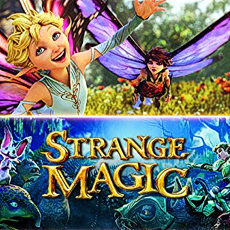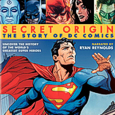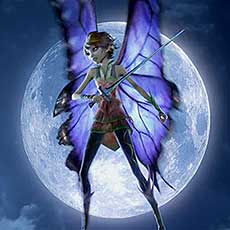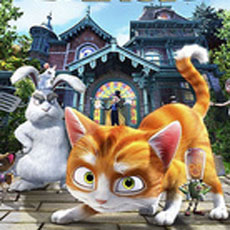Walt Disney Pictures/Centro Pictures/China Film Group (June 29 2007), Walt Disney Home Entertainment (January 27 2009), single disc, 84 mins plus supplements, 2.35:1 anamorphic widescreen, Dolby Digital 5.1 English, Mandarin and Cantonese Surround, Rated G, Retail: $29.99
Storyboard:
Young Beijing dreamer Raymond accidentally hooks up a gourd while out fishing, not realising that the fruit is actually magical and able to grant any wish! After several mishaps, during which the Gourd attempts to fulfil Raymond’s dreams but only results in causing more problems, Raymond learns that good old hard work and doing things for yourself is the only way to get things done right.
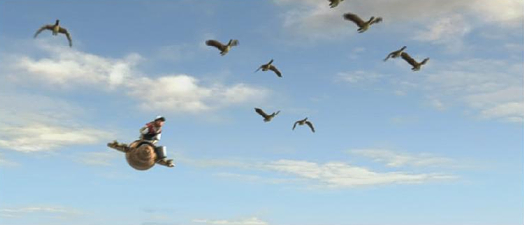
The Sweatbox Review:
With the shrinking of domestic and foreign box-office number set to continue not only due to the current economic climate, the big studios have begun to eye up emerging movie markets, in particular India and China, as new territories rip and ready for new releases. Disney has historically always been a studio willing to break out from its Burbank confines: Europhile Walt of course based many of his fairytales in European-influenced storybook lands, undertook a tour of South America in the 1940s resulting in a number of films designed for that then-developing market and, when he found profits from his classic early features could only be spent in cash-strapped, war-torn England, became one of the first of the few US studios to establish British businesses, developing a series of films that could be made and released there locally.
This wasn’t a “satellite studio” as has often been described in the past, but essentially a “studio for hire” situation, with Walt setting up shop at various facilities to create adaptations of celebrated British literature or folklore stories at famed locations such as Denham (Treasure Island, Robin Hood, Elstree (Rob Roy) and Pinewood Studios (many of the later 1950s films and television anthology specials) – films that were specifically aimed at filmgoers in the UK or that Walt could feature on his US television series and release in feature film formats internationally.
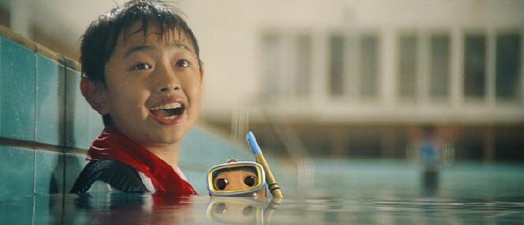
In recent times, India and China have begun to surface as potentially lucrative regions for motion picture production and distribution and here, too, Disney has always has a strong foothold in these areas, being among the first companies in the 1990s to reach an agreement to release their films in China, leading ultimately to Disney theme parks in Shanghai and Hong Kong. The next logical step was naturally to create original production locally, with the Studio taking a soft approach and entering co-pro deals to produce the fully-animated feature Roadside Romeo in and for India and, back in China, the animation and live-action combination The Secret Of The Magic Gourd.
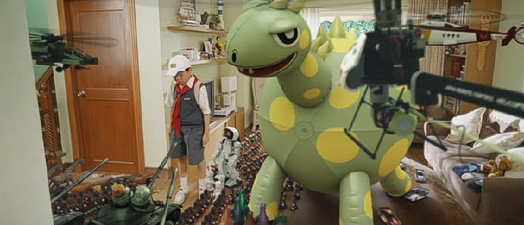
Very often films created in their native countries can still out gross imported product (see how popularly Miyazaki’s home-grown Studio Ghibli films stand against even the biggest US blockbusters in Japan), the new thinking that the Hollywood hot shots can entice those audiences to their locally produced films, bringing their moviemaking know-how to a project that otherwise looks and feels like an Indian or Chinese release, boosting profits that ultimately wind up floating back to those same Hollywood studios. It’s “backdoor filmmaking” to be sure, but it’s also opening up new worlds and fresh stories, with popular local talent now finding its way onto the international stage as a result. The first major title from any of the big players, The Secret Of The Magic Gourd was a respectable hit last summer on release in China and as such finds itself re-versioned into an English-language dub perfectly suited as a direct-to-video release in the US, thus creating a further extended market for these releases.
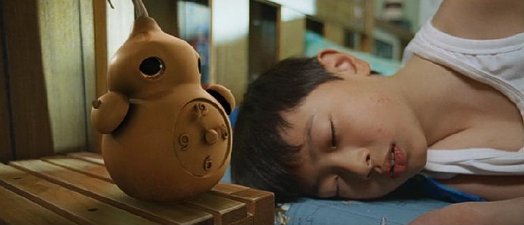
In all, it’s very smart business sense and as an added bonus, if these films can play well enough to all audiences then we benefit too, in at least being able to take a peek at what’s playing well around the world. And, in fact, Disney’s unmistakable mark is all over The Magic Gourd, especially in the attention lavished on the character animation of the Gourd himself. In this English-language dubbed version, his voice is provided – as the marketing is all too eager to tell us – by High School Musical’s Corbin Bleu, one of the current crop of Disney Channel moppets, but it turns out to be an interesting choice since he sounds much more mature than one would expect and the Gourd is actually intended to be some kind of man-child character in any event. It’s a nice pairing, and Bleu suits it well.

The dubbing itself is top-notch: forget the examples provided in the film’s DVD previews; this is as good as it gets for a foreign dub and honestly I could say that it didn’t even cross my mind that any vocal trickery had been used. Surely this is the result of the film being worded carefully so as to allow an ease in creating a later “international” version: there are no false pauses to accommodate the changes in language syntax, nor any moments where several lines of plot exposition have been attempted to be squeezed into just a couple of words’ worth of dialogue. Comparing the original Chinese language edition of The Magic Gourd, it’s easy to tell that all of the dialogue has been added in later anyway, so none of the tracks have that “on the set” feel to them, adding to the overall sense of fantasy and better helping the dub. Indeed, many English language trailers for films often use pivotal lines of dialogue over more action-orientated visual scenes in their advertising, so to criticise a dubbed production merely on the basis of seeing a preview doesn’t do things justice.
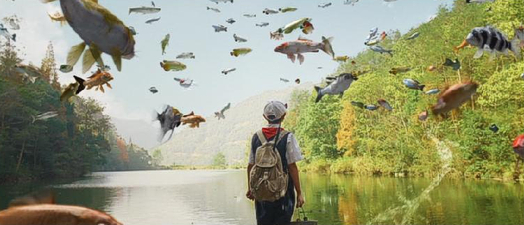
With the Disney Studio now being well into several years’ worth of experience on creating English versions for the Japanese films of Hayao Miyazaki and Studio Ghibli, they naturally do a fine job here, with veteran Disney voice director Rick Dempsey’s track accompanied by Centro’s digital animation that’s actually among the best I’ve seen in such fare for a long time. Peter Pui-Tak Kam’s musical score does a lot to lift the film’s fantasy elements (ranging from Zimmer-like military seriousness to Williams-styled expressions of freedom) and overcomes the mostly synthesized nature in the big moments, but there are some very neat effects and personality animation along for the ride too. From the “space race” opening to the exciting climax, highlights include Ray’s first meeting with the Gourd (fishing for food from mid-air and taking a quick flight), a toy store’s invasion of Ray’s bedroom, and a cool trip to a movie theater where Ray’s insistence that he “gets into the movie” winds up the prehistoric cast of “The Swamp Dino Strikes Back” becoming a little too real for comfort when the Gourd projects him into the movie!
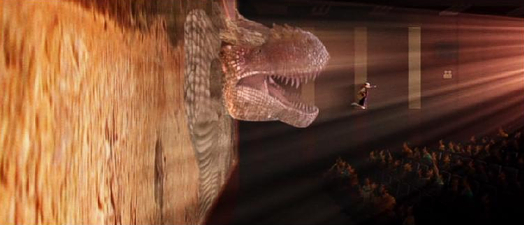
It’s all surprisingly fluid, well up to expected standards, never skimping on shots where they’re needed and adding in small touches here and there that wouldn’t go missed but just add an extra layer of magic. It’s no mistake that these cinematically developing countries are racing to provide quality visuals at cheaper prices, with Disney’s own Tinker Bell franchise the big draw for artists at companies in India, DreamWorks’ Madagascar Penguins series also being completed there, and the start up of LucasFilm Animation in Singapore, continuing work on The Clone Wars.
On the live-action side of things, one would imagine the quality to be easier to capture in that medium, but ever here China Film Group steps up to deliver a slick approach that doesn’t cut any corners and creates a nice dreamy vision of Beijing that further accommodates the animated fantasy elements so as not to unbalance the overall picture. As Raymond (switched from Wang Bao in the original edition for lip-synching purposes), Zhu Qi Long is a fresh-faced youngster who displays an uncanny knack in acting with props and later added characters who weren’t there on set and certainly works hard to make us believe all that is happening. He’s given warm support from Gigi Leung as his teacher under directors John Chu and Frankie Chi Hang Chung, who have created a lovely old-styled movie but with all the modern trimmings (and a nod to Mickey in the form of one of the schoolkids’ backpacks).
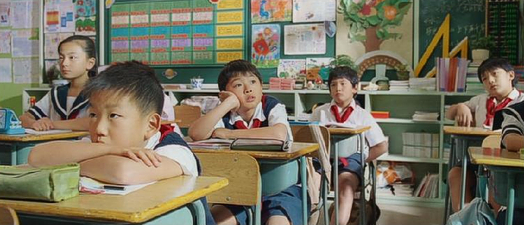
Bleu may be being given the promotional push on this US DVD release, and while his taking the character seriously compliments things immensely in making a fantasy personality believable, he’s far from the most important or best thing in the film even if he’s very good and grounds the Gourd without the script resorting to pop-culture references or forcing an ultra-hip characteristics upon him. Those ready to dismiss the film out of hand will be amazed at the level of strong character animation (actually, the Gourd himself is one of Disney’s more memorably mischievous recent individuals), and those coming to it without any background knowledge will surely be captured by the genuine wonder and magical elements that raise this above some other, more lavishly budgeted and exhibited American Studio fare (including Disney’s own).
Previously realised in a 1963 Chinese film, Zhang Tian Yi’s original “be careful what you wish for” type story comes to the screen again here in a spruced up, contemporary telling that updates the situations but retains the core values. Disney’s input is clear in the values of a different kind: the streamlined production and high quality sheen. It may hark back to a more naive time, and the Pete’s Dragon-like ending may well be spotted very early on, but whatever its origin, The Secret Of The Magic Gourd is an enjoyable, high class family adventure that should enchant children of all ages and teach us all a thing or two.
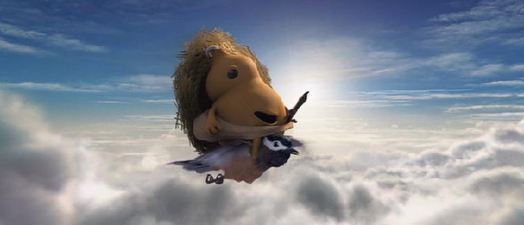
Is This Thing Loaded?
Delightfully, the Studio has seen fit to include a healthy, all things considered, supplements package that anyone with a serious interest in Disney’s international filmmaking aspirations will find a treat. But first, the FastPlay disc whooshes into action with the line-up of Sneak Peeks we would expect, this time around previewing Pinocchio’s Platinum Edition, and the debut of the new DisneyNature label’s Earth, a cut down of the BBC’s David Attenborough documentary series Planet Earth all slicked up into a bite sized feature-length event narrated by de facto warm voice of the moment (since Lord Of The Rings it seems) Ian McKellen. Additional previews play for Space Buddies, Oliver & Company: 20th Anniversary, the very odd teaser for Beverly Hills Chihuahua and Disney Movie Rewards, with trails for TinkerBell And The Lost Treasure, Bolt, the Disney Parks, School House Rock!: Earth and a new special edition of “Walt Disney’s” The Black Cauldron, selectable from their own menu option.

I mentioned some generous extras, and we’ll get to those in a second, but general audiences will probably enjoy the Too Many Toys! game, which is actually a good deal of fun for this sort of thing, found in the Bonus Features option on the very fun animated Magic Gourd menus. Taking its lead from a scene in the movie, the toys have invaded Raymond’s room – and his father is on the way home! The player must match up the packing crates to the first ten toys ready to be flown back to the store so that the Gourd can take care of the rest. It’s fairly simple and therein lies the charm: without an over complicated set up and easy to select options, there’s almost no time delay in the animation clips used here which means the game can pick up a fair old speed, adding to the fun. Although there are only ten toys to pick, the couple of rounds I tried out did seem to switch the routines around subtly, so it should provide a few minutes of enjoyment for most.
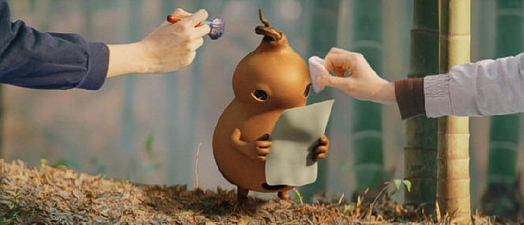
With The Secret Of The Magic Gourd trailed on so many recent Disney DVDs, an official trailer doesn’t really feel missing, but we are offered some amusing Bloopers created for promotional purposes. Also dubbed into English in the style of the movie, these are Pixar-styled faked up flubs (there’s even the usual Buzz Lightyear reference), with the Gourd itself “on set” bearing the brunt of most of the mishaps. It’s not the most original minute and a half you’ll ever see, but two of the “outtakes” made me laugh, and the decent compositing still impresses, especially for something as throwaway as this. More publicity material comes next, with a World Of Wonder Music Video, presented in its original Chinese version in letterboxed widescreen. It won’t make much sense to English speakers (optional lyric subtitles would have been a must even if we’ve heard the song in English in the end credits) but the song’s got a catchy chorus as sung by Baby Zhang Hanyun, and the glossy four minute video shows off the production values of the movie effectively.
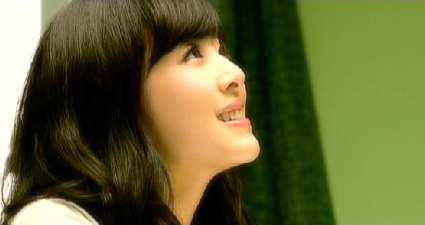
Saving the best for last is the generous half-hour documentary Behind The Scenes With The Gourd, a lengthy discussion on how the film was put together that’s better than some of Disney’s own home-grown productions manage to find themselves accompanied with on disc. Following production under directors John Chu and Frankie Chi Hang Chung from the pages of the original book, through casting, live-action photography, special effects stage work, animation and music, this is a fully rounded look at the entire making of the picture, as considered and reflective as you might expect the Chinese to be. The original native name for our young boy hero, Wang Bao, is revealed, as is a really cool theatrical poster that sits in the background of some interviews but that might well have been too familiar a design to western audiences.
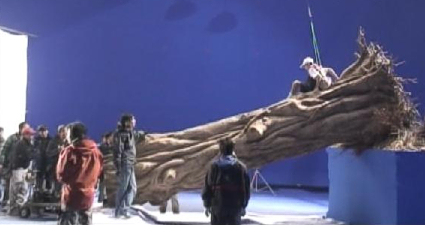
Being a product of Chinese television it’s naturally focused on that edition of the movie, with topics covered including original Gourd voice Chen Peisi (instead of Corbin Bleu), a well-known voice in Disney animated films to the Chinese having dubbed Mushu among many others, and the difficulties inherent in animating a lead character that essentially doesn’t have a nose or eyebrows to help with expression. The impressive stats (a four year production period including two years of shooting and animating with over 140 artists) add to the feeling that this was a prestige production and not a rush-job, a sentiment evident in the final result. Not everyone will find this documentary appealing, its origin also means it’s presented only in its native language, though this time there are optional – and essential – English subtitles. The US dub is sadly overlooked: Corbin Bleu did carry out promotional duties (several interviews can be found online) and it would have been easy and more complete to include at least one of these here, but it’s an otherwise fully-rounded package.
Case Study:
Now it’s here that one must admit Disney has been more than a little cheeky: a first glance at Magic Gourd’s packaging would not alert anyone to the fact that this is a dubbed Chinese-produced film. The front cover purposely gives the attention to the Gourd and a frolicking frog (that only appears for a scant few minutes in the film), with only the bottom of Zhu Qi Long’s shaded out face visible and a sticker on the glossy (non-embossed) slipcase promoting Corbin Bleu’s involvement.

The back isn’t much better, with images of Qi Long either too small or with his back to us and the contractual credits squished down enough to be missed or unreadable. I’m not suggesting Disney would want obscure the fact that there’s not one fresh-faced American kid in this movie, but they don’t go out of their way to promote the foreign faces either. Inside, Disney Movie Rewards and Blu-ray are promoted on inserts, while there’s some shiny color disc art too.
Ink And Paint:
Presented in its theatrical ratio of 2.35:1, kudos to Disney for not serving up a cropped ratio or a fullscreen hack job. Taken from what looks like a pristine film print, the transfer here does its job without being anything too special, with a hint of video noise mixed with the grain that shouldn’t be off putting to anyone even if at times the image is a little soft. It’s by no means blurred and most of the time it’s very sharp without any edge enhancement trying to fool us, the fun, Armageddon-like opening showing off the effects work, easily on the impressive level of a well-budgeted comedy.
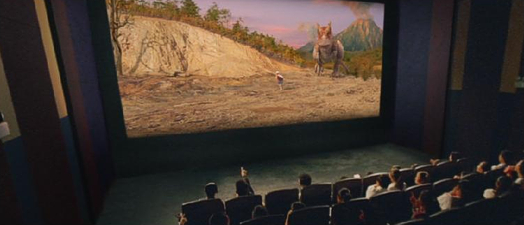
The cinematography and editing go above what’s needed for the film to work and never call attention to themselves, providing the perfect visual vehicle for young eyes to experience another culture, especially after the interest that the recent Olympic Games brought to this region of our world.
Scratch Tracks:
There also must be praise for the soundtrack options: the dub is, as mentioned, as good as they come, but we also get the chance to hear the film as originally recorded in Mandarin, and in a Cantonese dub too. I only sampled the Mandarin version sporadically, choosing to go with the English dub that most will pick and that more suits the English language credits (I don’t know if these have been created especially for this edition or if this is how Magic Gourd played in China). I found the Chinese options felt less bass-enhanced overall, but also noticed that they lacked some various spot effects here and there, which the English track managed to make more a feature of. Disney’s obviously aiming at the many Chinese families living in America who may well have heard about the film from relatives, but it’s a bonus for those that would prefer to see the film with the original dialect and watch with English subtitles (via the Hearing Impaired option).
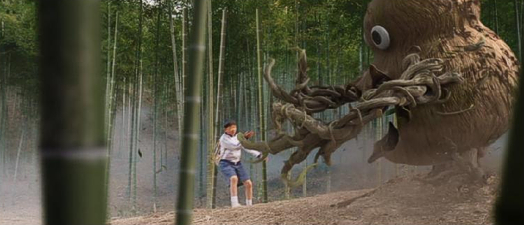
Final Cut:
I had been looking forward to experiencing Disney’s first foreign co-production simply out of historical interest but was truly delighted to find a very warm, fun and excellently produced motion picture. The Secret Of The Magic Gourd’s biggest secret is how much this outshines more home-grown Disney fare, with some wonderful central performances from the live actors and dubbed vocalists as well as some unexpectedly high-end quality animation from Centro that has obviously benefited from Disney’s expertise but retains its own style. I’m now looking forward to future such films even more and would suggest to those ready to dismiss them that this new avenue for the Studio’s output isn’t going to dilute or destroy their heritage, but add to it in new ways and with new stories that have yet to be discovered. Let’s hope that more of these films find their way to the US, with my eye caught by the Indian success story Roadside Romeo. If Disney can then market those films in dubbed editions to home audiences, then that’s all the better for those creating them in the first place, and the Magic Gourd’s team certainly deserves the potential wider audiences.
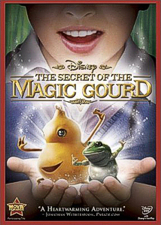 | ||
 |






